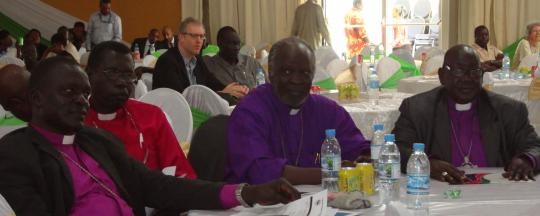The National Platform for Peace and Reconciliation (NPPR) in South Sudan will encourage citizens to speak openly about human rights abuses and grievances, according to a planner of the initiative, while facilitators will gather the people’s recollections into a ‘body of truth.’
The platform was launched on 5 April, spearheaded by the Committee for National Healing, Peace and Reconciliation headed by Archbishop Daniel Deng. Leaders of the initiative have declared themselves to be independent of the South Sudanese government, saying the government has ‘no hand’ in it.
According to an advisor involved in the new initiative, the reconciliation process is largely about discussing honestly and openly the truth of what has happened in South Sudan in the past.
Ferdinand von Habsburg-Lothringen, Advisor at the Committee for National Healing, Peace and Reconciliation in South Sudan, said that the process should be open to all. “The most fundamental issue was to make the process inclusive, with participation by different political and social layers of the society as well as different geographic regions,” he said.
He said the facilitators of the reconciliation platform will reach out to people and make them comfortable to express grievances, including addressing not only recent grievances but also issues since the birth of Sudan in 1956.
“This is the opportune moment to actually engage and bring out the many issues that they have probably been keeping back for many, many years,” he said in an audio interview published on the website of the Geneva Centre for Democratic Control of Armed Forces (DCAF), a foundation founded in 2000 on the initiative of the Swiss government.
He explained, “The process is intending to open up spaces across the country that will invite South Sudanese to come forward and share the grievances that individuals hold, that communities hold about past and present actions.”
‘Body of truth or truths’
Von Habsburg-Lothringen stressed that people will be allowed to talk about human rights abuses and grievances: “South Sudanese should feel that this is the appropriate moment at which to raise these issues.”
“That constitutes then a body of truth or truths, I think would be the best way of putting it – that will help to define the broad nature of the issues and would then help to develop a process around it eventually,” he added.
The advisor noted that the leaders of the initiative plan for consultations to continue for up to two years.
The consultations will result in data collection, reports and recommendations. “Within that then comes the whole issue of accountability, and looking at how that will first of all open issues that have been closed for a very long time, so it would constitute a very open way of addressing issues that have been concealed,” he said.
“That whole new culture of honesty, openness and truth will be one of the most significant underlying philosophies for governance in South Sudan,” added Von Habsburg-Lothringen.
Reconciliation will remove fear
“It will probably take away some of the negative power that has been attributed to the armed forces, to people in government – those kind of areas they have been using to leverage communities and to frighten them and to scare them and to essentially say we have power over you,” said the advisor.
“And I think that power would essentially be removed through that exercise where hopefully communities or individuals can confront those who have been in power and have misused and abused their power,” he added.
Structure of the platform
Von Habsburg-Lothringen emphasized that the process needs to be owned by South Sudanese in order to be successful, not by any international organizations.
He described the Committee for National Healing, Peace and Reconciliation as the “driving engine” behind the reconciliation initiative in the country, referring to the committee on which church leaders, civil society and Muslim representatives sit.
“That structure provides the bedrock against which other related institutions have agreed and also very proactively engaged with the committee to try to build, strengthen and support that,” he said, referring to a government commission and a parliamentary committee also involved in the platform.
“The key difference between the committee and those two other bodies is that the committee has been mandated to look at the past and past actions that constitute grievances and human rights abuses,” he emphasized.
The national committee will also link up with the South Sudan Council of Churches and civil society, working through these networks to establish a ‘popular platform’ for the reconciliation drive.
“Beyond that it would then reach out towards political parties, the army, the police all the other kind of major structures of government that are either numerically significant or significant form the point of view of either defending or undermining the process and would be very very core in terms of their outreach through their constituent parts,” he added.
Engagement would these bodies would constitute a “wider extension of the platform,” he noted.
Photo: Bishops of the Episcopal and Roman Catholic Church in Juba, South Sudan, 5 April 2014 (Radio Tamazuj)
Related coverage:
Bishops to South Sudan leaders: ‘Stop the war’ (13 Apr.)
Wau bishop says peace initiative to be extended to state level (7 Apr.)
Independent peace initiative launched in Juba (7 Apr.)




